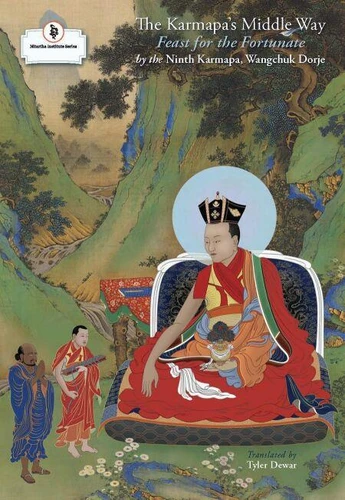The Karmapa's Middle Way. Feast for the Fortunate
Par : ,Formats :
Disponible dans votre compte client Decitre ou Furet du Nord dès validation de votre commande. Le format ePub protégé est :
- Compatible avec une lecture sur My Vivlio (smartphone, tablette, ordinateur)
- Compatible avec une lecture sur liseuses Vivlio
- Pour les liseuses autres que Vivlio, vous devez utiliser le logiciel Adobe Digital Edition. Non compatible avec la lecture sur les liseuses Kindle, Remarkable et Sony
- Non compatible avec un achat hors France métropolitaine
 , qui est-ce ?
, qui est-ce ?Notre partenaire de plateforme de lecture numérique où vous retrouverez l'ensemble de vos ebooks gratuitement
Pour en savoir plus sur nos ebooks, consultez notre aide en ligne ici
- Nombre de pages816
- FormatePub
- ISBN978-1-55939-873-2
- EAN9781559398732
- Date de parution02/07/2019
- Protection num.Adobe DRM
- Taille5 Mo
- Infos supplémentairesepub
- ÉditeurSnow Lion
Résumé
Marked by eloquent poetry, vigorous and extensive analysis, and heart instructions on breaking through the veils of confusion to independently experience the true nature of things, The Karmapa's Middle Way contains the Ninth Karmapa Wangchuk Dorje's comprehensive commentary on the Indian master Chandrakirti's seminal text, the Madhyamakavatara, or Entrance to the Middle Way. This commentary, Feast for the Fortunate, is the Ninth Karmapa's abridgement of the Eighth Karmapa Mikyö Dorje's masterpiece, the Chariot of the Takpo Kagyü Siddhas.
In it, readers will find previously unavailable material on the Karmapas' Middle Way view and a rare window into a philosophically charged era of Middle Way exposition in Tibetan Buddhism. It includes Chandrakirti's root text to the Entrance to the Middle Way and its commentary by the Ninth Karmapa; an introduction detailing the history of the Middle Way, key Middle Way philosophical principles, and the main points of each chapter of the text; an annotated translation of a famous excerpt of Chandrakirti's Lucid Words; and other useful appendices and reference materials.
In it, readers will find previously unavailable material on the Karmapas' Middle Way view and a rare window into a philosophically charged era of Middle Way exposition in Tibetan Buddhism. It includes Chandrakirti's root text to the Entrance to the Middle Way and its commentary by the Ninth Karmapa; an introduction detailing the history of the Middle Way, key Middle Way philosophical principles, and the main points of each chapter of the text; an annotated translation of a famous excerpt of Chandrakirti's Lucid Words; and other useful appendices and reference materials.
Marked by eloquent poetry, vigorous and extensive analysis, and heart instructions on breaking through the veils of confusion to independently experience the true nature of things, The Karmapa's Middle Way contains the Ninth Karmapa Wangchuk Dorje's comprehensive commentary on the Indian master Chandrakirti's seminal text, the Madhyamakavatara, or Entrance to the Middle Way. This commentary, Feast for the Fortunate, is the Ninth Karmapa's abridgement of the Eighth Karmapa Mikyö Dorje's masterpiece, the Chariot of the Takpo Kagyü Siddhas.
In it, readers will find previously unavailable material on the Karmapas' Middle Way view and a rare window into a philosophically charged era of Middle Way exposition in Tibetan Buddhism. It includes Chandrakirti's root text to the Entrance to the Middle Way and its commentary by the Ninth Karmapa; an introduction detailing the history of the Middle Way, key Middle Way philosophical principles, and the main points of each chapter of the text; an annotated translation of a famous excerpt of Chandrakirti's Lucid Words; and other useful appendices and reference materials.
In it, readers will find previously unavailable material on the Karmapas' Middle Way view and a rare window into a philosophically charged era of Middle Way exposition in Tibetan Buddhism. It includes Chandrakirti's root text to the Entrance to the Middle Way and its commentary by the Ninth Karmapa; an introduction detailing the history of the Middle Way, key Middle Way philosophical principles, and the main points of each chapter of the text; an annotated translation of a famous excerpt of Chandrakirti's Lucid Words; and other useful appendices and reference materials.



